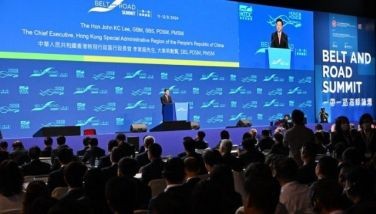Japan's rare intimacy coordinators in demand after abuse scandals
On a set outside Tokyo, Momoko Nishiyama sits with the drama's director and watches as a man undresses a woman, guiding the love scene as one of just two "intimacy coordinators" in Japan.
The country's film and television industry has been hit by a string of recent sexual abuse allegations that have led to apologies and movies being pulled.
But while Hollywood has embraced intimacy coordinators in the wake of the #MeToo movement, they are still relatively new in Japan, where public reaction to the latest scandals has been muted.
"In the United States, everyone knows what an intimacy coordinator is, but in Japan, I have to start by explaining what it is that I do, and that I'm not the director's enemy," Nishiyama told AFP.
The 43-year-old's recent projects include a TV series with multiple intimate scenes.
On set, she confers with the director and observes actors, advising them how to move and adjusting their outfits.
But her work starts well before anyone shouts "action", beginning with a close read of the script.
"I say to the director: 'Here it says A embraces B, will it go further than that?' or 'What clothes will the actors be wearing? How undressed will they get?'" Nishiyama explained.
She then meets privately with each actor to determine their boundaries.
"This is a scene without a bra. If we don't show your chest, are you okay with it?" is one question she might ask.
For 23-year-old actor Asuka Kawazu, Nishiyama offers reassurance.
"Her presence made discussions easier," she told AFP.
Without an intimacy coordinator, "a case could arise where we agree on something, but then when shooting we realize we're going much further than we had planned," she said.
Lack of solidarity
Despite several high-profile allegations, the #MeToo movement was less pervasive in Japan than in some other developed countries.
But Nishiyama has seen demand for her services increase after multiple accusations of sexual harassment and abuse in her industry.
Some of the allegations prompted a group of directors including celebrated auteur Hirokazu Kore-eda to call for change, but the reaction from other professionals in the field was more subdued.
Miwa Nishikawa, who is part of the group, told AFP the directors "were shocked" both by the accusations and the industry's inaction.
"Unlike in the West or South Korea where the #MeToo movement took hold, the Japanese industry wasn't able to change."
"I think it shows a lack of solidarity between workers in the industry, where there is no organization to unite and protect them," she said.
The group hoped its statement "would make it easier for people to speak out", said Nishikawa.
The directors back the use of intimacy coordinators, though Nishikawa cautions that won't be enough to end abuse off-set.
Still, their presence shows that "the safety and dignity of actors and staff" are more protected.
"That can create an atmosphere that discourages harassment."
She and her fellow directors also want sensitivity training and industry guidelines for casting and shooting, warning that otherwise "incidents and accidents" will keep happening.
Mathias Cena
Agence France-Presse
- Latest


























